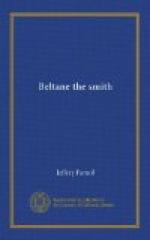But now, while the Reeve yet stood, pale in the torchlight, finding nought to say, came Beltane beside him.
“My lord,” quoth he, “fifty and three is a goodly number; must they all die to-morrow?”
“To-morrow? Aye—or whensoever Sir Gui wills.”
“Ah, fair lord,” says Beltane, “then, as I guess, these fifty and three shall assuredly live on awhile, since Sir Gui of Allerdale will hang men no more.”
“Ha, dare ye mock me, knave?” cried Sir Robert, and clenching iron hand he spurred upon Beltane, but checked as suddenly, and pointed where, midst the shrinking populace, strode one in knightly armour, whose embroidered surcoat bore the arms, and whose vizored helm the crest of Sir Gui of Allerdale. Now beholding this silent figure, a groan of fear went up, divers men sank crouching on their knees, the Reeve uttered a hoarse gasp and covered his face, while even Beltane, staring wide-eyed, felt his flesh a-creep. But now Sir Robert rode forward:
“Greeting, lord Seneschal!” said he, “you come betimes, messire, though not over hastily, methinks!”
“Forsooth,” quoth the figure, his voice booming in his great war-helm, “forsooth and verily there be three things no man should leave in haste: videlicit and to wit: his prayers, his dinner and his lady. None the less came I hither to give thee greeting, good my lord.”
“My lord Seneschal, what manner of men be these of thine?”
“O fair sir, they be ordinary men, rogues, see you, and fools—save one, a comely man this, an archer unequalled, hight Giles o’ the Bow, a man of wit, very full of strategies and wiles.”
“Aye, but what of yon tall knave, now,” said Sir Robert, pointing at Beltane, “who is he?”
“Forsooth, a knave, my lord, an arrant knave with long legs.”
“He will look well on a gibbet, methinks, Sir Gui.”
“Indeed, my lord he might grace the gallows as well as you or I.”
“The rogue telleth me that you will hang men no more.”
“Ha, said he so forsooth? dared he so asperse mine honour? Ha, here is matter for red-hot irons, the pincers and the rack, anon. But come, Sir Robert—thou dost bear news, belike; come your ways and drink a goblet of wine.”
“Nay, my lord, I thank thee, but I must hence this night to Barham Broom. But for my news, ’tis this: the out-law men call Beltane, hath, by devilish arts, sacked and burned Garthlaxton Keep.”
“Why, this I knew; there is a lewd song already made thereon, as thus:
“They gave Garthlaxton to the flame,
Be glory to Duke Beltane’s
name,
And unto lusty Giles the same,
Dixit!”
“Forsooth, a naughty song, a very gallows’ song, in faith. Pray you, what more?”
“There hath come unto the Duke one hight Gurth—a hang-dog rogue that doth profess to know the lurking-place of this vile outlaw, and to-morrow at sunset, Sir Pertolepe and I with goodly force march into the green. So now must I hence, leaving with thee these captives from Bourne that you shall hang above the walls for a warning to all such outlaws and traitors. Lastly, my lord Seneschal, drink not so deep a-nights, and so, fare thee well.”




